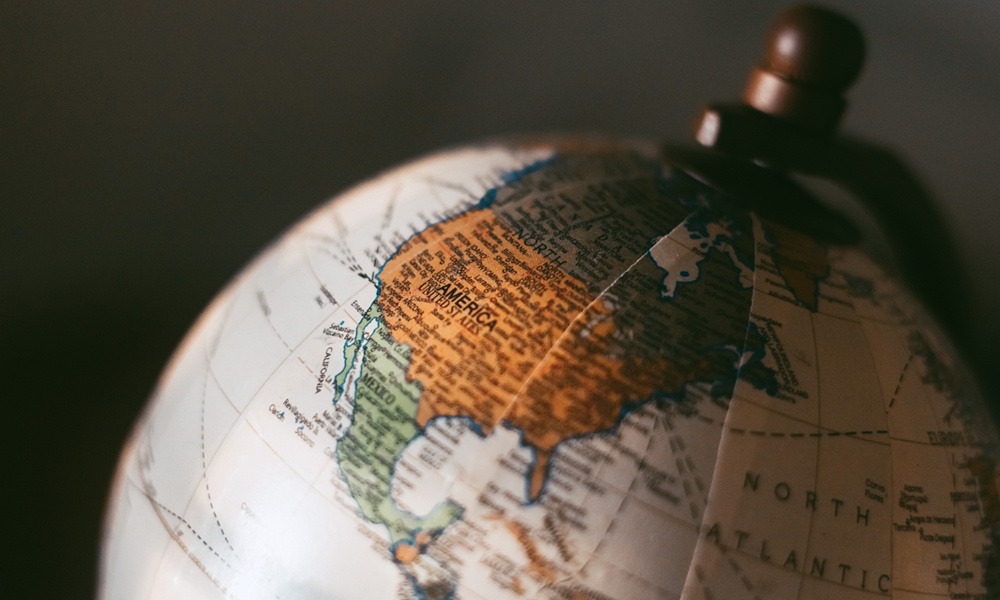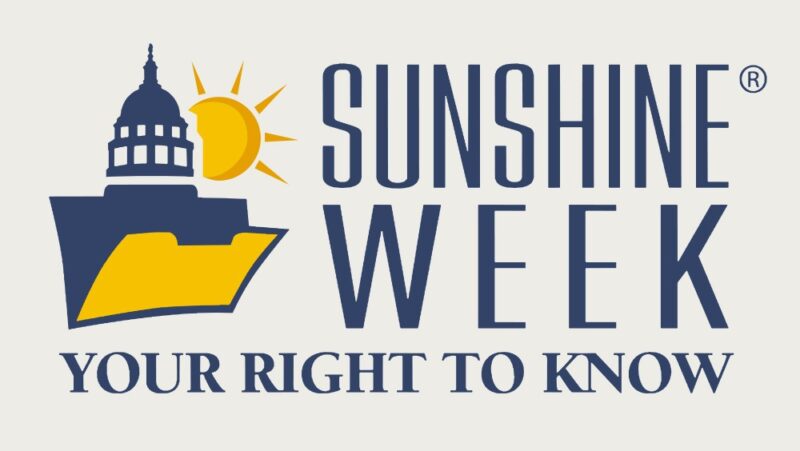World Press Freedom Day 2023: U.S. Black Holes and Bright Spots

Press freedom is like a seatbelt: often underappreciated, unknown or even unused until you need it. When you do need it, you’ll be really glad you have it.
It’s important for the press to be a watchdog on government, a growing proportion of Americans agree.
Yet of U.S. journalists surveyed by the Pew Research Center, 57% say they’re extremely or very concerned about future restrictions on press freedom.
Where the U.S. stands on World Press Freedom Day 2023
As the United Nations marks 30 years of World Press Freedom Day on May 3, it’s worth remembering how a mere four words in the First Amendment – “or of the press” – is the basis for press freedom in the United States.
Despite having prime constitutional billing, U.S. news outlets and journalists don’t enjoy the freest press conditions in the world. The U.S. doesn’t even rank in the top 20.
Wait, what?
Reporters Without Borders (known by their French initials, RSF) ranks the U.S. as 42 out of 180 countries. But that is up two spots from the 2021 ranking.
As RSF’s annual report puts it: “In the United States, once considered a model for press freedom and free speech, press freedom violations are increasing at a troubling rate.”
Similarly, global advocacy organization Freedom House gives the U.S. a three out of four on press freedom conditions. Not the worst, but there’s room to improve.
Certainly the U.S. isn’t North Korea, which RSF consistently ranks last.
Nor is it Russia, where the recent arrest of Wall Street Journal reporter Evan Gershkovich and ongoing treatment of imprisoned opposition leader, advocate of free expression and 2023 Freedom Forum Free Expression Award honoree Alexey Navalny makes the country’s press freedom ranking of 155 out of 180 countries seem too generous.
RELATED: Celebrate champions of free expression at the 2023 Free Expression Awards
Since 2017, the U.S. Press Freedom Tracker has catalogued incidents involving arrests, harassment, threats, assaults and more against journalists. Its managing editor, Kirstin McCudden with the Freedom of the Press Foundation, says it grew out of a need to track this data in one place.
“The utility of the tracker grows every year,” McCudden says, noting its ability to reflect on the state of press freedom in the United States.
U.S. press freedom black holes
West Virginia Public Broadcasting
West Virginia Public Broadcasting, licensed to the state government, fired reporter Amelia Ferrell Knisely last December. The reporter claimed it was after pressure from state officials who didn’t like her reporting on accusations against a state agency and its treatment of people with disabilities.
NPR media correspondent David Folkenflik covered the fallout, reporting: “Interviews with 20 people with direct knowledge of events at West Virginia Public Broadcasting indicate Knisely's involuntary departure from her position as a part-time reporter was not an aberration but part of a years-long pattern of mounting pressure on the station from Gov. Jim Justice's administration and some state legislators.”
More than 200 local public radio stations, members of the NPR network, are independently owned and operated. Those stations are nonprofits, often licensed to public entities, such as universities, school districts, or in a few cases, state governments.
Whether these stations are licensed to an independent nonprofit or to a public entity, their editorial independence is what makes them essential and reliable news sources. Government funding of any amount does not equal editorial control. When interference happens, it undermines public trust in a free press.
Florida license proposal
A bill introduced this year in Florida immediately drew the ire of free press groups – and Gov. Ron DeSantis – for seeking to make “bloggers who write about elected officials to register with the state.”
The bill doesn’t target journalists working at established news outlets, but the spirit runs afoul of the First Amendment.
“53% would support a special licensing process for journalists, like that for doctors and lawyers – perhaps not recognizing press freedom is a right for all and that licensing would limit this freedom,” according to Freedom Forum’s 2022 Where America Stands survey.
Proposals like this aren’t new, particularly in the past 20+ years as publishing and sharing information by people who don’t work for traditional news outlets has become easier. The First Amendment protects more than just “the press,” an amorphous term more than 200 years on. It protects every person’s freedom to talk, write, or share opinions about government or any topic. Attempts to license people, be they journalists, bloggers or your neighbor complaining on Nextdoor will always draw scrutiny as being unconstitutional.
Three Affiliated Tribes
Despite the First Amendment’s broad protections for U.S. journalists, those freedoms generally don’t extend to sovereign Native American nations and their tribal-owned media. Federal and state freedom of information laws broadly guarantee anyone can request and receive communications of public officials and other government documents. But these laws don’t cover tribal governments.
For example, the Three Affiliated Tribes of North Dakota have been accused of multiple transparency violations of its own constitution and bylaws, according to the Society of Professional Journalists.
These violations caused the Society of Professional Journalists to give the tribal nation its annual Black Hole Award, which “highlights the most heinous violations of the public’s right to know.”
Journalists who work for tribal-owned media and groups like the Native American Journalists Association and Indigenous Media Freedom Alliance have been pushing tribal governments to extend free press protections and broaden transparency, press access and freedom of information within their sovereign nations.
U.S. press freedom bright spots
Journalist Protection Act
Journalists in all countries, working in all kinds of conditions, often risk their lives while doing their jobs. Sadly, some die or are murdered every year while seeking and reporting the truth, even in the United States.
In February, Dylan Lyons of Spectrum News 13 was shot and killed while reporting on the scene of an earlier shooting. Photojournalist Jesse Waldman was shot and hospitalized. Last year, Las Vegas Review-Journal reporter Jeff German was killed at his home. An elected public official whom German had investigated and reported on has been indicted on a murder charge.
Most Americans, 61%, said journalists deserve special protection from harm, the Freedom Forum found.
U.S. journalism groups are pushing for a federal law called the Journalist Protection Act. The First Amendment only protects against government actions that would restrict the free press. According to RTDNA, the law would: “Make it a federal crime to intentionally intimidate or cause bodily harm to a journalist or media organization in the course of newsgathering or reporting. It would also allow the Justice Department to prosecute those who intimidate or assault journalists when local prosecutors decline to do so.”
Federal Shield Law
Outside of physical harm, journalists can face legal pressure to testify in court or give up confidential sources. Unlike an attorney-client privilege or protections for clergy members who hear confidential confessions, journalists don’t necessarily have the same protection at the federal level. Such protections would help journalists uncover wrongdoing by ensuring they can’t be compelled to give up their confidential sources. Otherwise, a journalist could go to jail if they refuse.
Journalist groups have been pressing for more than 15 years for a federal shield law, formally called the Free Flow of Information Act. While there is no such federal law, every state except Wyoming has similar legal protections for journalists through laws or court rulings.
Despite bipartisan support, efforts to pass a federal shield law have come up short. Some journalists and free press groups have hesitated on the idea because it may require Congress to define who is and isn’t a journalist. That could lead to licensing of the press, which as seen in the Florida case, seemingly violates the First Amendment.
News outlets rise as others close
There is plenty of doom and gloom in certain areas of journalism, particularly newspapers owned by large national chains.
Gannett, the country’s largest chain, has laid off more than half its staff in the past four years after merging with competitor GateHouse Media. The combined company had about 25,000 employees in 2019. Today, it’s 11,000.
(Disclosure: Freedom Forum’s roots are tied to Gannett, as the former Gannett Foundation became Freedom Forum in 1991. The current structure is completely independent of Gannett.)
More broadly, the federal Bureau of Labor statistics projects journalism jobs to decline 9% by 2031.
As Gannett and other companies lay off journalists and close news outlets, communities are left with no local outlets, becoming news deserts.
That’s where philanthropy and start-up funding have stepped in. Multiple initiatives have started in the past five-to-ten years seeking to fill gaps in local newsroom staffing or to launch newsrooms.
- Nonprofit News and Funding: The Institute for Nonprofit News and American Journalism Project give seed funding, start-up resources, and technical/fundraising support for new locally focused news outlets.
- Early-Career Positions: Report for America matches hundreds of early-career journalists with local news outlets that need reporters, helping to fund their salaries and provide mentorship to keep them in the profession.
- Pushing for Investment: The Rebuild Local News Coalition, founded by the same person who co-founded Report for America, is pushing for local, state and federal policies that will help fund investments in local news.
Lighting the darkness on World Press Freedom Day
The Washington Post’s tagline reminds us that democracy dies in darkness.
While the U.S. won’t leap to the top or sink to the bottom of the world press freedom index this year or anytime soon, there is reason for hope. People still believe that a free and independent press is important. Protecting those freedoms – on World Press Freedom Day and every day – is an ongoing process.
The more light we shine on areas of darkness, the less likely we are to take press freedom for granted.
Scott A. Leadingham is a Freedom Forum staff writer, journalist and journalism trainer. Follow him on Twitter at @scottleadingham.
U.S. Journalist Evan Gershkovich Marks One Year of Imprisonment in Russia
Sunshine Week: Support Your Local Journalists
Related Content

